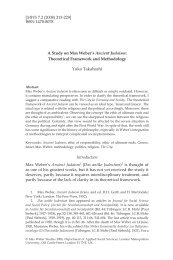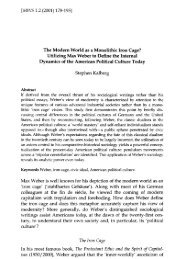Disenchantment, Enchantment and Re ... - Max Weber Studies
Disenchantment, Enchantment and Re ... - Max Weber Studies
Disenchantment, Enchantment and Re ... - Max Weber Studies
You also want an ePaper? Increase the reach of your titles
YUMPU automatically turns print PDFs into web optimized ePapers that Google loves.
20 <strong>Max</strong> <strong>Weber</strong> <strong>Studies</strong><br />
son M<strong>and</strong>ela, the present Pope, Princess Diana—has been materially<br />
aided by the globalization of the media.<br />
However, to reiterate my earlier point, that we have grounds for<br />
scepticism about the impact or scope of disenchantment does not<br />
mean that we should ab<strong>and</strong>on the notion, or the wider concept of<br />
rationalization. There is much too much evidence of both, in our own<br />
experience <strong>and</strong> in the social science research literature, to encourage<br />
such recklessness. If <strong>Weber</strong> was even half right in suggesting that a<br />
plurality of visions <strong>and</strong> underst<strong>and</strong>ings was threatened by an everwidening<br />
<strong>and</strong> totalizing ‘objective’ knowledge of the world, then this<br />
is, indeed, a matter of ‘world-historical significance’ (Schroeder 1992:<br />
160). It is certainly the case that the rational–bureaucratic–scientific<br />
model has been taken up <strong>and</strong> successfully transplanted into an enormous<br />
range of soils <strong>and</strong> environments. This has been possible because<br />
it is a way of doing things—<strong>and</strong> a vast array of things at that—which,<br />
in important ways, works.<br />
Ritzer’s recent use of the fast food restaurant as a metaphor for contemporary<br />
processes of rationalization, in his notion of ‘McDonaldization’<br />
(Ritzer 1993, 1998; Smart 1999), has been such a successful development<br />
of <strong>Weber</strong>’s thinking precisely because of the degree to which<br />
rationalization continues its progress through the modern world. But<br />
McDonalds <strong>and</strong> McDonaldization are also interesting because their<br />
ultra-rationalized approach <strong>and</strong> method have not been introduced in<br />
the same way everywhere. Their core simplicity permits the flexibility<br />
with which to adapt, in a properly self-interested capitalist manner, to<br />
the dem<strong>and</strong>s <strong>and</strong> preferences of different markets. Nor has McDonalds<br />
simply been foisted on a world of passive dopes; it is used <strong>and</strong><br />
taken up by its customers in different ways in different localities<br />
(Watson 1997). And, as events in southern France during 1999 demonstrated,<br />
McDonaldization can provoke significant—<strong>and</strong> successful—<br />
popular resistance. Most tellingly, from the point of view of this paper,<br />
as Ritzer has recently begun to explore (1999), the relationship between<br />
disenchantment <strong>and</strong> enchantment in McDonaldization, <strong>and</strong> in<br />
contemporary consumption more generally, is neither unidirectional<br />
nor straightforward. ‘Disenchanted enchantment’ is thus not the paradox<br />
it might, at first sight, seem.<br />
Which Takes us Back to Rationalization…<br />
Perhaps before it is anything else, rationalization is an intellectual<br />
process: ‘the process of intellectualization which we have been undergoing<br />
for thous<strong>and</strong>s of years’, an ‘intellectual rationalization, created




